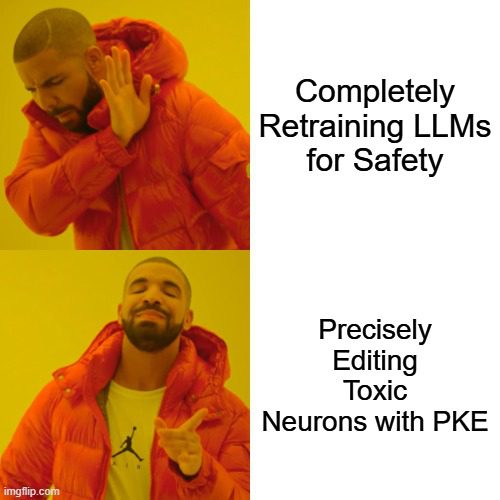A New Era in AI Safety
The landscape of artificial intelligence (AI) is rapidly evolving, and with it comes the need for enhanced safety measures. A recent breakthrough in AI safety has been announced with the introduction of Precision Knowledge Editing (PKE). This innovative approach redefines toxicity reduction in large language models (LLMs) while maintaining performance and precision. The PKE paper is available for detailed reading here, and the PKE code can be accessed on GitHub.
The Importance of AI Safety
As AI systems become more integrated into various aspects of our lives, ensuring their safety and reliability is paramount. The potential for AI to generate harmful content has been a significant concern, as highlighted by research from companies like Anthropic. Their findings on vulnerabilities in LLM technology, where persistent questioning can bypass safety guardrails, underscore the need for robust safety measures. More on this can be found in the TechCrunch article.
Precision Knowledge Editing (PKE)
PKE represents a significant advancement in the field of AI safety. It focuses on reducing toxicity in LLMs without compromising their performance. This is crucial for applications where AI systems interact with users, such as chatbots and customer service platforms. The ability to maintain high performance while ensuring safety makes PKE a valuable tool for developers and researchers.
Applications and Implications
The applications of PKE are vast, ranging from improving the safety of conversational AI to enhancing content creation tools. For instance, companies like p0 are leveraging LLMs to identify safety and security issues in software before production. Their AI-powered code quality assurance platform uses LLMs to understand code contextually and create relevant challenges to identify vulnerabilities. This proactive approach reduces the need for extensive testing and manual effort, offering a one-click solution with minimal configuration. More details on p0’s innovative approach can be found here.
Ethical Considerations
While advancements like PKE are promising, they also bring ethical considerations to the forefront. The potential for bias in LLMs and the need for transparency in how these technologies identify vulnerabilities are critical issues. Researchers and developers must ensure that AI systems are not only effective but also fair and unbiased. This is particularly important in applications like code security and API security, where biases can have significant implications.
Future Directions
The development of PKE and similar technologies marks a step forward in AI safety. However, ongoing research and collaboration are essential to address the evolving challenges in this field. Initiatives like the repository of AI risks released by MIT researchers provide valuable insights into potential vulnerabilities and help guide the development of safer AI systems. More information on this initiative can be found here.
Future Prospects
The future of AI safety looks promising with innovations like PKE. As the technology continues to evolve, it is crucial to stay ahead of potential risks and ensure that AI systems are designed to be safe, reliable, and ethical. The growing awareness of AI safety and the increasing focus on responsible AI development are positive trends that will shape the future of AI.
Related Articles
- 5 Ways to Implement AI into Your Business Now
- 10 Ways AI Can Help You Ace Exams
- Understanding Direct Preference Optimization in AI: Revolutionizing Human-Centric Machine Learning
- Launching Deep Lex: Where Law Meets AI
- The introduction of Precision Knowledge Editing (PKE) marks a significant milestone in the journey towards safer AI systems. PKE focuses on reducing toxicity in large language models (LLMs) while maintaining their performance and precision. This breakthrough is particularly relevant in the context of the growing demand for AI-powered solutions in various sectors, including software development and cybersecurity. The PKE paper and code are available for further exploration here and here.
Related Articles
- 5 Ways to Implement AI into Your Business Now
- 10 Ways AI Can Help You Ace Exams
- Understanding Direct Preference Optimization in AI: Revolutionizing Human-Centric Machine Learning
- Launching Deep Lex: Where Law Meets AI
- Model-Based Design: AI Accelerates Medical Innovation
Looking for Travel Inspiration?
Explore Textify’s AI membership
Need a Chart? Explore the world’s largest Charts database
